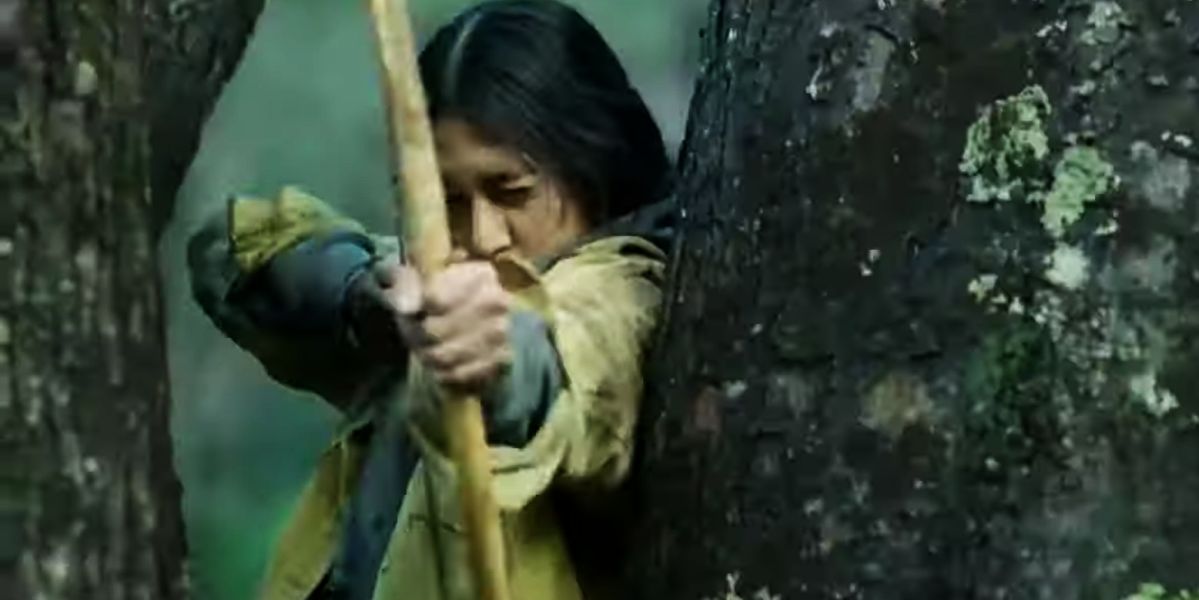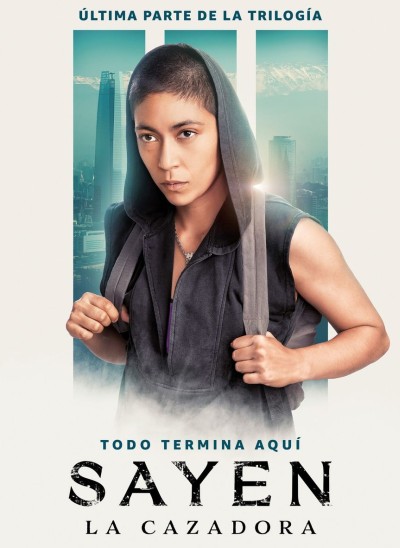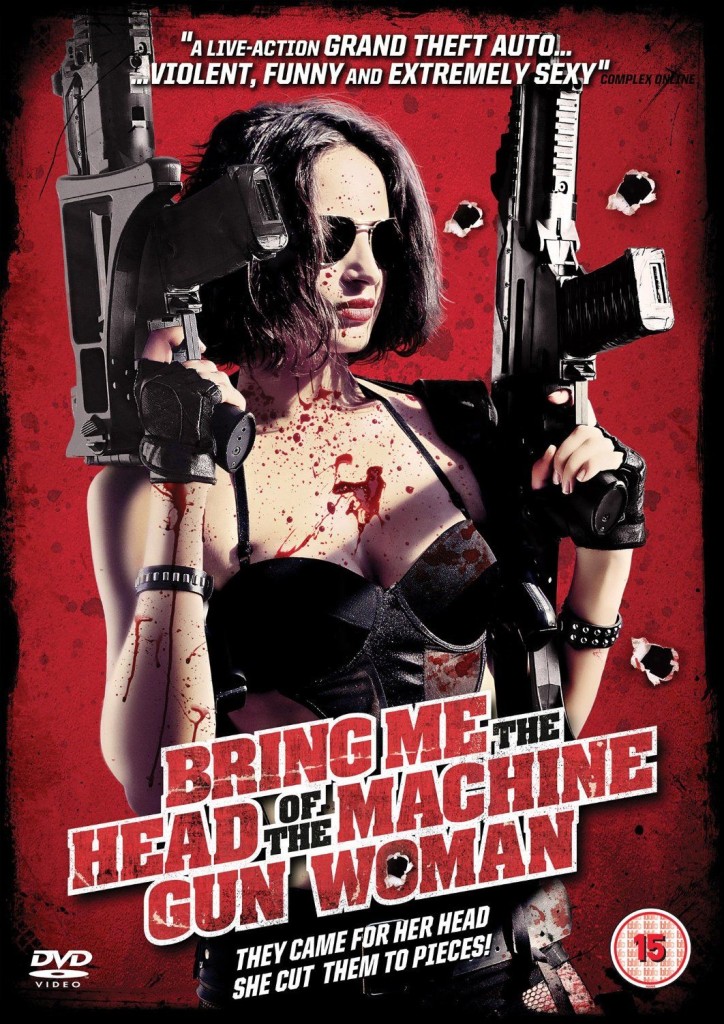 I was rather surprised to see the name of Alexander Witt pop up as the director, at the end of the first movie in this Chilean trilogy. He has been a stalwart second-unit director in Hollywood for decades, going back to Speed in 1994. With regard to the site, he fulfilled the same role on Aeon Flux, but is best-known as the director of the second film in the Resident Evil franchise, Resident Evil: Apocalypse. That was his sole directorial credit prior to Sayen, and I must confess… I was today years old when I discovered he was Chilean. I presumed he was German, based off his name and his work on the Berlin-shot Apocalypse. But, no. Born in Chile, albeit of German descent. He returned there to take the helm, almost 20 years later – again with an action heroine story.
I was rather surprised to see the name of Alexander Witt pop up as the director, at the end of the first movie in this Chilean trilogy. He has been a stalwart second-unit director in Hollywood for decades, going back to Speed in 1994. With regard to the site, he fulfilled the same role on Aeon Flux, but is best-known as the director of the second film in the Resident Evil franchise, Resident Evil: Apocalypse. That was his sole directorial credit prior to Sayen, and I must confess… I was today years old when I discovered he was Chilean. I presumed he was German, based off his name and his work on the Berlin-shot Apocalypse. But, no. Born in Chile, albeit of German descent. He returned there to take the helm, almost 20 years later – again with an action heroine story.
Sayen
★★½
This takes place in the Araucanía region, where Sayen Coñuepan (Montenegro) has just returned to her indigenous homeland. Her grandmother is presented with an offer for her land, but a suspicious Sayen discovers it’s a front for a mining company. Things escalate, with Antonio (Piper), the junkie son of the company’s head, Máximo Torres (Arce), shooting the old woman dead. Sayen vanishes into the jungle, with Antonio and his henchmen in hot pursuit, knowing that if Sayen is allowed to go public with what she knows, it could make things very difficult for the company. However, this is very much her territory, and she has skills to make things potentially very difficult for them.
 As a jumping-off point, this is… okay, I guess. It begins with a po-faced caption which informs the viewer this is going to be an Important Message Movie. The early going is a bit of a slog, leading to me coming to the conclusion, just because something is “traditional” doesn’t necessarily make it any good. Once granny is gunned down, the film shifts gears and gets more energy. However, I was expecting Sayen to go full Rambo, using the environment to her advantage. She doesn’t really, short of crafting a bow, which she uses one (1) time, and a bit of impromptu first-aid. Meanwhile, the bad guys could hardly be less subtle about their villainy, if they were given wax mustaches to twirl.
As a jumping-off point, this is… okay, I guess. It begins with a po-faced caption which informs the viewer this is going to be an Important Message Movie. The early going is a bit of a slog, leading to me coming to the conclusion, just because something is “traditional” doesn’t necessarily make it any good. Once granny is gunned down, the film shifts gears and gets more energy. However, I was expecting Sayen to go full Rambo, using the environment to her advantage. She doesn’t really, short of crafting a bow, which she uses one (1) time, and a bit of impromptu first-aid. Meanwhile, the bad guys could hardly be less subtle about their villainy, if they were given wax mustaches to twirl.
Admittedly, this may be necessary to make things clear for the international audience, who may not be up to speed on the intricacies of indigenous politics at the bottom of South America. We need black hats and white hats: keep things simple. Oh, and Chilean rap. Okay. It is interesting how Sayen doesn’t kill anyone – at least not directly. Oh, people die in her wake. Quite a few of them. However, it’s things like death through careless driving, for example. Or pointing a speedboat at a pier, then leaping off. Given the circumstances, surely no jury in the land would convict. After this lacklustre opening, while I can’t say I was keen to get to the next installment, I’m reluctant to quit any story in the middle.
Sayen: Desert Road
★★★
However, I felt the sequel works a little better. It takes place in an entirely different environment, relocating from the southern forests to the Atacama desert, one of the driest places in the world. The enemy remains Actaeon, the predatory industrial corporation headed by Torres, who have built a lithium extraction facility, after bribing their way to approval. Sayen, now with a businesslike crew-cut, is looking to find evidence of this corruption, and gets help from Qumal (Sánchez), a young woman whose father was among those who accepted the money. A SD card contains the required proof, but Acteon and their minions remain hot on Sayen’s trail, and prepared to stop her, by any means necessary.
This is at least somewhat more nuanced and less simplistic. While Torres remains the personification of evil, things are greyer elsewhere. A good example, is Qumal’s father: turns out he used the money received from Acteon to build a school for the town. There’s also one of the minions, Gasper, whose loyalties seem flexible, and who makes good points about the realities of life in the area. Sayen, though, is largely unbothered by these, though still defiantly proclaims herself not to be a murderer, despite what the authorities and media are saying about her. The desert locations provide some good opportunities for vehicular mayhem. I’d say Actaeon should probably look at revamping their driving courses, because some of their employees literally can’t steer to save themselves.
I’m still not entirely on board with Sayen’s mission: I tend not to feel eco-terrorism is better than any other flavour. However, this benefits from not needing to spend time on set-up, though does mean you really can’t watch it without having seen the first part. I was definitely surprised by a couple of twists at the end, where one character I expected to survive into the next movie, ended up dead, and one I thought was already dead, turned out to be alive. This set things up for the third installment, with Actaeon’s parent company Greencorp proving, in the corporate world, there’s always someone bigger and more morally dubious than you. Will Sayen be able to continue her battle, and also maintain her “clean hands” policy? Guess we’ll find out…
 Sayen: The Huntress
Sayen: The Huntress
★★★
There’s a further shift in setting here, the series moving to an urban location, of the Chilean capital Santiago, where Sayen has joined up with a group of activists. They are seeking evidence that Greencorp, under its CEO Fisk (Aarón Díaz), has bribed senators to vote against a bill protecting the country’s water from exploitation. There’s treachery on both sides, with a mole in Sayen’s group bringing heat on their heels, in the particularly interesting shape of female enforcer Jo (Niav Campbell – not to be confused with Neve Campbell!). On the other hand, they receive help from an unexpected source, because it’s not just eco-terrorists who have had enough of Fisk’s shenanigans…
There are some positives here, with the city landscape providing another fresh set of locations for Witt to work in action sequences, including zip-lines, base jumping and cycling. I particularly enjoyed the multiple battles between Jo and Sayen, although the director is still too inclined to go with the quick cuts, as he did in RE: Apocalypse. There’s a decent balance between the action and drama, with the high-level political intrigue working well. On the other hand, the film suddenly drops in a romantic interest for the heroine, which had me wondering where this came from. I wouldn’t worry about it. He isn’t around for long. It all ends a little too neatly, Sayen apparently able to sustain her position on the moral high ground.
All told, if you said this was a South American take on The Millennium Trilogy, I would not be inclined to disagree. In both cases, you have a young woman with a grudge against the powerful, who has the skills to make them pay for their unpunished crimes. Sayen is more hands-on than Lisbeth Salander, although the latter could take care of herself. I think the heroine here is probably less unstable: without the death of her grandmother to propel her down this path, you could easily see Sayen living a normal life, getting married, having kids and perhaps opening a legal help centre for the local residents. Instead, she ended up hunting the head of a global corporation, seeking justice for relentlessly putting the quest for profits ahead of everything else.
After a bit of a shaky start, putting the message ahead of the medium, the second and third films made for decent entertainment. They were all close to the ninety minute mark, avoiding the cinematic bloat we see too often in movies that do not need to be two-plus hours, and Witt’s experience in well-staged action is apparent. Having a heroine who won’t directly kill, but who is not averse to cracking heads if necessary, is a tricky needle to thread, and I’m not sure this is always successful. On the other hand, Sayen comes from a fresh and interesting background, and the trilogy as a whole does explore new territory. I can’t truly recommend it, but if you are interested in watching these, nor would I argue against it. You do you, gentle reader – you do you.
Dir: Alexander Witt
Star: Rallen Montenegro, Enrique Arce, Arón Piper, Katalina Sánchez





 This is not an easy film to watch. The easily-offended should stay away. Indeed, even the hard to offend, which include myself, may find it rough going. To give you some idea, the opening scene is set in a 1978 Chilean torture chamber where a political dissident is being interrogated. When she won’t talk, her son is drugged and forced to rape his own mother. It actually goes on to get worse still, but that’ll give you some idea. In terms of disturbing opening scenes, I can’t think of many equivalents.
This is not an easy film to watch. The easily-offended should stay away. Indeed, even the hard to offend, which include myself, may find it rough going. To give you some idea, the opening scene is set in a 1978 Chilean torture chamber where a political dissident is being interrogated. When she won’t talk, her son is drugged and forced to rape his own mother. It actually goes on to get worse still, but that’ll give you some idea. In terms of disturbing opening scenes, I can’t think of many equivalents. Business is on the streets, check it out.
Business is on the streets, check it out.










